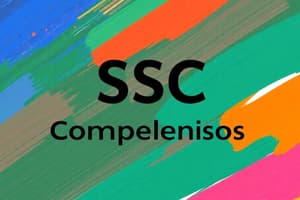Podcast
Questions and Answers
What is required to glean information from various sources according to the text?
What is required to glean information from various sources according to the text?
- Understanding of complex equations
- Grammar rules mastery
- Fluency in a second language
- Good reading comprehension skills (correct)
Why is it emphasized to approach reading with active engagement?
Why is it emphasized to approach reading with active engagement?
- To avoid passive consumption (correct)
- To speed up the reading process
- To increase word recognition
- To admire the physical book covers
What key skills do students develop through exposure to great works of literature?
What key skills do students develop through exposure to great works of literature?
- Drawing techniques, cooking expertise, musical talent
- Memory recall, time management, social media skills
- Critical thinking abilities, imagination, empathy (correct)
- Mathematical problem-solving, coding skills, physical strength
Why is studying literature considered valuable within English language education?
Why is studying literature considered valuable within English language education?
Which of the following is NOT mentioned as a component of effective English language education in the text?
Which of the following is NOT mentioned as a component of effective English language education in the text?
What is stated as a consequence of not truly understanding what you are reading?
What is stated as a consequence of not truly understanding what you are reading?
What does grammar refer to in the context of English language education?
What does grammar refer to in the context of English language education?
Which aspect of grammar can greatly enhance one's writing skills?
Which aspect of grammar can greatly enhance one's writing skills?
What is reading comprehension commonly referred to as?
What is reading comprehension commonly referred to as?
Which of the following is NOT an element of grammar in English language education?
Which of the following is NOT an element of grammar in English language education?
Why is a good grasp of grammatical elements important for learners?
Why is a good grasp of grammatical elements important for learners?
In English language education, what does understanding complex rules of grammar involve?
In English language education, what does understanding complex rules of grammar involve?
Flashcards are hidden until you start studying
Study Notes
Grammar, Reading Comprehension, and Literature in English Language Education
English is one of the most widely spoken languages globally and serves as a primary means of communication between nations. As such, its proficiency is essential for personal growth, professional success, and international understanding. Mastering English involves more than just learning vocabulary and memorizing sentence structures; it also requires understanding complex rules of grammar, achieving high levels of reading comprehension, and engaging with literary works from various cultures. Let's explore each aspect individually.
Grammar
Grammar refers to the system of rules governing the composition of clauses, phrases, and sentences in any given natural language. In the context of English language education, grammar encompasses topics like subject-verb agreement, tense usage, punctuation, conjunctions, prepositions, and much more. A good grasp of these grammatical elements allows learners to express themselves clearly and effectively while avoiding common errors. For instance, knowing when to use 'whom' versus 'who', can greatly enhance one's writing skills. Learning how to correctly use commas to separate independent clauses can prevent confusion among readers.
Reading Comprehension
Reading comprehension, often referred to simply as "comprehending", is the ability to understand what is being said or written by another person in a particular situation. It goes beyond mere word recognition and includes comprehending the meaning conveyed through text. Good reading comprehension skills allow individuals to glean information from various sources, which could range from news articles to novels. This skill has become increasingly important due to the internet age where access to vast amounts of information is readily available at our fingertips. However, it's crucial to approach reading with active engagement instead of passive consumption because without truly understanding what you're reading, much of the value will be lost.
Literature
Literature is creative work produced using the medium of written or spoken words to communicate thoughts, ideas, emotions, dreams, desires, aspirations, fears, etc.. Within the realm of English language education, studying literature provides students valuable insights into different societies, eras, cultural norms, customs, beliefs, behaviors, attitudes, values, ideologies, philosophies, and so forth. Through exposure to great works of literature—such as Shakespearean plays or Victorian poetry—students develop critical thinking abilities, imagination, empathy, and social awareness. These skills transcend academic pursuits and serve them well even after post-secondary studies.
In conclusion, mastery over English grammar, developing strong reading comprehension skills, and exploring diverse forms of literature are interconnected components of effective English language education. Each contributes uniquely towards enhancing our communicative competence and cognitive development. Whether we aim to excel academically or professionally, embracing these aspects will undoubtedly equip us better for facing life's challenges in today's globalized world.
Studying That Suits You
Use AI to generate personalized quizzes and flashcards to suit your learning preferences.




